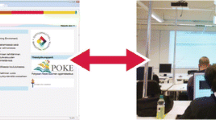Abstract
Selecting the best profession from the antic until today have been looking for new ways in order to improve the methods for advising to the people interesting in continuing their formation in higher education. Several efforts have been develop from the education field, and now with Information and Communication Technologies (ICT) tools support. However, nowadays-integral solutions in order to correct this issue are scare explored. This paper presents the advance in the research in order to create a Virtual vocational guidance model that allows advising in real time to people interesting in get a professional degree. Action research design approach has been applied in order to get interactive information from higher education applicant and improve prototype and model by each interaction. Early outcomes have shown increase the number of student that access to higher education. Outcomes allow us show a list of recommendation in order to find ways for applied ICT tools as support for effectiveness vocational guidance.
Access this chapter
Tax calculation will be finalised at checkout
Purchases are for personal use only
Similar content being viewed by others
References
Alvárez Quiroz, G.B.: Percepciones de los docentes rurales con respecto a las tecnologías de la información y comunicación en sus prácticas pedagógicas (Master’s thesis) (2016)
Rodríguez, R.: El efecto de la orientación vocacional en la elección de carrera. Recuperado de (2016). http://pepsic.bvsalud.org/scielo.php?script=sci_arttext&pid=S1665-75272008000100004
Cabero, J.: Impacto de las nuevas tecnologías de la información y la comunicación en las organizaciones educativas. En Lorenzo, M., et al. (eds.) Enfoques en la organización y dirección de instituciones educativas formales y no formales, pp. 197–206. Grupo Editorial Universitario, Granada (1998)
Lorenzo, M., et al.: enfoques en la organizacion y direccion de instituciones educa. Granada: grupo editorial Universitario(1998)
Maura, V.G.: La Orientación Profesional desde la perspectiva histórico-cultural del desarrollo humano. Revista Cubana de Psicología 20(3), 260–268 (2003). http://pepsic.bvsalud.org/pdf/rcp/v20n3/12.pdf
Vidal, W.L., Ledo, C., Pardo, M.E.: Papel o rol de los profesores en el Entorno Virtual de Enseñanza Aprendizaje (EVEA). Revista Pedagógica Maestro y Sociedad 12(4), 92–100 (2015)
Alvarez de Sayas, C.M.: La Escuela en la vida, p. 487. ALSIE Consultores Pedagógicos S.R.L. Décima Edición, Pág (2016)
Calonge Cole, S.: Fundamentos contextuales de la orientación educativa. INVESTIGACIÓN Y POSTGRADO 19(1), 145–170 (2004). Recuperado de http://revistas.upel.edu.ve/index.php/revinpost/article/view/1466/613
Navarro, L.: Análisis de las páginas WEB de orientación vocacional de las comunidades autónomas y su relación con la acreditación de las competencias profesionales (Tesis de maestría). Universidad de Valladolid (2014). Recuperado de https://uvadoc.uva.es/bitstream/10324/4504/1/TFM-G277.pdf
Sein, M.K., Henfridsson, O., Purao, S., Rossi, M., Lindgren, R.: Action design research. MIS Q. (35: 1), 37–56 (2011)
Clark, H.F.: The influence of economic forces upon education. Teachers College Rec. 32(4) (1931)
Acknowledgments
The authors wish to thank the Technical University of Manabí for the support and access to the experimental spaces that have enabled the scientific motivations to be put into practice.
Author information
Authors and Affiliations
Corresponding author
Editor information
Editors and Affiliations
Rights and permissions
Copyright information
© 2019 ICST Institute for Computer Sciences, Social Informatics and Telecommunications Engineering
About this paper
Cite this paper
Santana, G., Mendoza, K., Zambrano, M., Chancay, C., Meza, J. (2019). Toward a Virtual Vocational Guidance Model. In: Sun, G., Gan, J., Liu, S., Lang, F., Lu, Z. (eds) e-Learning, e-Education, and Online Training. eLEOT 2019. Lecture Notes of the Institute for Computer Sciences, Social Informatics and Telecommunications Engineering, vol 299. Springer, Cham. https://doi.org/10.1007/978-3-030-35095-6_28
Download citation
DOI: https://doi.org/10.1007/978-3-030-35095-6_28
Published:
Publisher Name: Springer, Cham
Print ISBN: 978-3-030-35094-9
Online ISBN: 978-3-030-35095-6
eBook Packages: Computer ScienceComputer Science (R0)




